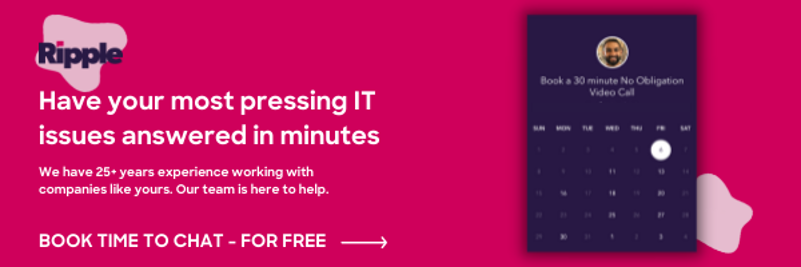
Philosophy is simply defined as a way of thinking about a particular subject.
And, while most people wouldn’t put “philosophy” and “IT services” in the same context - much less the same conversation - we do.
When evaluating your IT provider relationship, think about the subjects we have covered in previous posts including support, strategy, execution and security. These subjects form the basis of your IT company’s philosophy and it’s absolutely prudent to ensure that their way of looking at things aligns with your own company’s outlook.
Why?
Philosophical alignment in your IT relationship drives valuable outcomes.
Let’s discuss:
Philosophy: Simplicity
Simplicity should lead every aspect of your IT provider relationship. It should be simple to get help, resolve service issues, and discuss strategy or changes.
You get the picture. But when you’re asking a prospective IT service provider about the ease of their services, the answer will undoubtedly always be, “Of course it’s simple!”.
So how do you determine if their idea of “simple” aligns with yours? Here are two specific areas that can help you with your decision:
Focus
A partnership cannot work if both parties don’t share the same focus. Good service and relationships start with you and the IT partner you are evaluating having the same ideas of what is most important, otherwise the service and relationship will be negatively impacted.
A few questions to ask yourself when thinking about focus:
- Can you state what your company values are in an IT relationship?
- Are you able to state what your prospective IT services company’s main focus is in a single statement and can they?
- Can you (or they) state it in a way that does not include the words “support”, “service”, “secure” or “best”?
- Does their focus align to your organization’s values?
- Does their website align to their focus as well?
A simple focus statement that can be expressed in non-IT specific terms based around value is key. In addition, that value must align to what your organization values to make the prospective partner a good fit.
Think about this way: if your organization values strategy and solutions that empower your users, are you going to partner with an IT provider whose focus is to provide you the “best support experience”? Will they help you with strategy or implement solutions that create minimal issues for your users? It is an interesting paradox. If the they value providing great support, then minimizing the need for support flies in the face of their services.
Additionally, a clear and understandable focus can give you a non-technical common set point to refer to when evaluating IT suggestions or directions.
Take away point:
Your prospective IT service provider’s focus should be simple and consistent. It must also reflect what your organization values in an IT service provider.
Language
Did you know that there are well over 3,000 IT-related acronyms that are commonly used? Talk to any IT person attempting to prove their expertise and you will probably hear quite a few letter combinations you’ve never heard of. Unfortunately, insider language has become all too commonly accepted by IT practitioners and clients.
Think about any service-related interactions you would typically have, like an auto repair technician, your doctor or a financial advisor. Do you accept a conversation that is filled with exclusive insider language or confusing industry acronyms? Of course not. So why would you accept that from your IT service company?
Much like focus, communication with your IT service company should be simple and value-focused. This goes for all levels of interactions, including support, projects, and account service. A truly aligned relationship based on shared values will rarely be lost in the weeds of techie acronyms and jargon.
Take away point:
There is a time and place for technical explanations. However, finding an IT service company that can speak to your organization in simple non-technical terms is critical to a lasting relationship.
Philosophy: Earning the Business at Every Interaction
Most managed IT services companies came from a break/fix or consulting background. Both models charged hourly and the revenue was variable. This was a tough way to scale a company if they provided an inconsistent experience. But at the same time, it was an opportunity to earn the business at every interaction.
As the industry evolved, the managed services model was introduced. Managed services provided a way for IT service providers to be more proactive and charge a monthly fee to assist their clients. Contracts were introduced with the promise of a partnership between IT provider and client.
While the shift to the managed services model did provide benefits for both sides, one key aspect of the old hourly model was lost: making each interaction awesome and reinforcing the relationship.
With the introduction of contracts, a pattern developed. Many MSPs channeled their energy on getting new clients to sign 1-3 year contracts. They would deliver on promises for the first few months and then after that would figure out ways to do as little as possible to maintain the relationship, usually in the form of reactive support.
As you evaluate your future IT relationship, ask yourself these questions:
- Are we looking for an IT service company or an IT support company?
- Is the maintenance of the current relationship acceptable?
Once you have gathered thoughts around that, evaluate your options. Look for an IT service company that actively engages in earning your business every day. Every provider out there will say they will earn your business and some will guarantee the experience for the first 30 days. But the only organization truly committed to earning your business will be the one that will have a month-to-month contract or a 1-year commitment with a simple no-questions-asked 30-day out.
Take away point:
In the managed services world, a long-term contract is disincentivizing to most providers. Contracts may be necessary, but make sure there is a clear no-penalty way out of the relationship if the partner is not living up to your values.
Basically, we believe that philosophy and alignment are a great place to start in evaluation of an IT service company. The chances of being successful are greatly diminished if you don’t see eye to eye in terms of how your IT service provider approaches the relationship.
Ripple's IT Team
Don't Fall Behind!
Get the latest work-from-home and Humans First® IT tips straight to your inbox.
